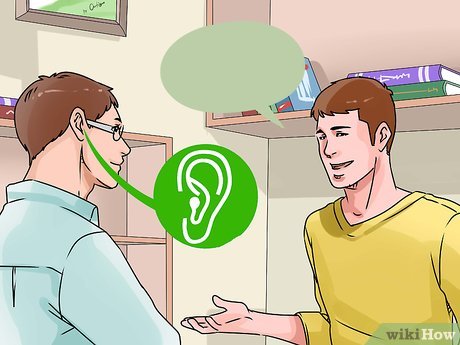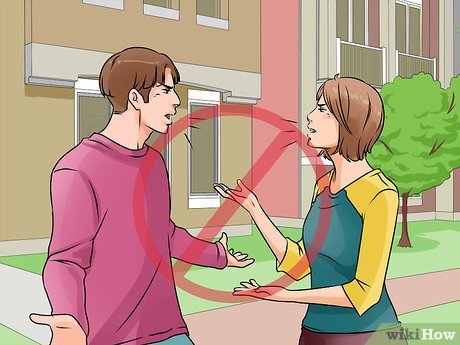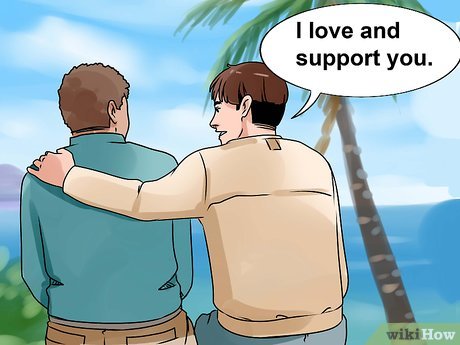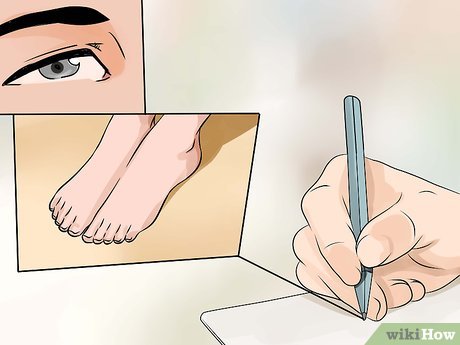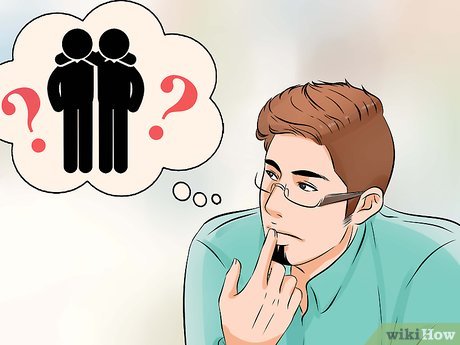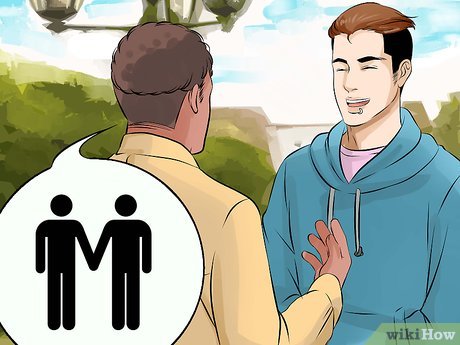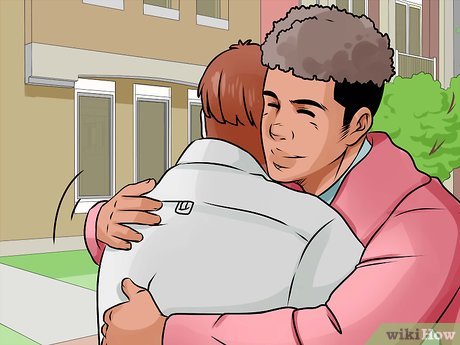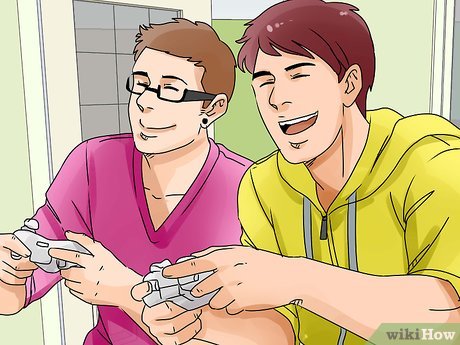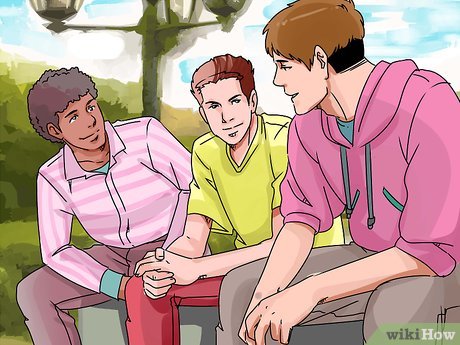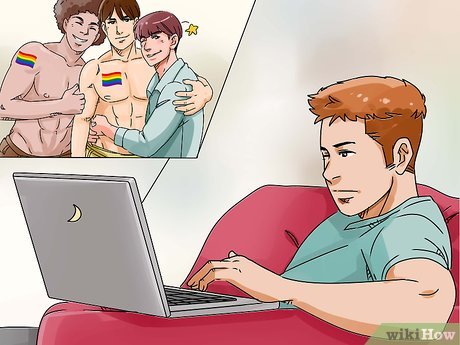How to Deal when Your Best Friend Is Gay
Part 1 of 3:
Supporting Your Friend While They Come Out
-
 Listen to what your friend has to say. You may already know that your friend is gay, however, it's important to let him or her actually say it to you. It took a lot of courage for your friend to address this issue, so give your full attention.[1]
Listen to what your friend has to say. You may already know that your friend is gay, however, it's important to let him or her actually say it to you. It took a lot of courage for your friend to address this issue, so give your full attention.[1] -
 Don't interrupt your friend. Let your friend say what they want to say. It is important to keep the focus on how they feel about coming out, rather than about your feelings on the matter.[2]
Don't interrupt your friend. Let your friend say what they want to say. It is important to keep the focus on how they feel about coming out, rather than about your feelings on the matter.[2] -
 Put your friend at ease. Tell your friend, "I love and support you." When your friend comes out to you, they may be nervous that you will reject them after you hear the news. Be an ally and quickly assure your friend that you love them and that, while the news may be surprising, it does not change your relationship together.
Put your friend at ease. Tell your friend, "I love and support you." When your friend comes out to you, they may be nervous that you will reject them after you hear the news. Be an ally and quickly assure your friend that you love them and that, while the news may be surprising, it does not change your relationship together.- That said, you may need some time to digest the news in order to come to terms with it. Tell your friend if that is the case, but be very nice about it. Try saying, "I am very surprised by the news but I love you and I just need a little time to process it." Remember they may be very sensitive at the moment.
-
 Don't tell other people. It is important to respect your friend's privacy and not spread the word around your friend group and beyond. Instead, you should let your friend tell who they want to. Coming out can be scary and intense, and you should leave that job up to your friend.
Don't tell other people. It is important to respect your friend's privacy and not spread the word around your friend group and beyond. Instead, you should let your friend tell who they want to. Coming out can be scary and intense, and you should leave that job up to your friend.- Try asking your friend "Who have you come out to?" If you want to talk about your friend to a parent or guardian, try asking "Would you be okay with me mentioning that you're gay to my parents if it came up, or would you prefer that I keep it quiet?"
Part 2 of 3:
Coming to Terms With the News
-
 Reflect on the news for a while. How do you feel? If you find it a bit confusing, or are struggling to come to terms with it, don't feel mad at yourself. The fact that you're trying to overcome this shows that you are a good friend.
Reflect on the news for a while. How do you feel? If you find it a bit confusing, or are struggling to come to terms with it, don't feel mad at yourself. The fact that you're trying to overcome this shows that you are a good friend.- Did you have romantic feelings for your friend? If your friend likes people of your sex, you are now free to ask them out! If your sexual orientations aren't compatible, it may be hard to take. You might like to read about how to deal with unrequited love or how to fall out of love with your best friend.
-
 Accept this as a part of a person you already know and love. Make a list of all the qualities you love about your friend. Remember, being gay doesn't change your friend's personality. And telling you about who they are shows that they care about you and want to share the important parts of their life with you.
Accept this as a part of a person you already know and love. Make a list of all the qualities you love about your friend. Remember, being gay doesn't change your friend's personality. And telling you about who they are shows that they care about you and want to share the important parts of their life with you. -
 Decide whether you can continue the friendship. If you are really bothered by your friend's sexual orientation, then you may need to think about whether or not you can still be a good friend to this person. If you do not think that you can provide the person with the same quality of friendship, then it may be better for you to end the friendship. Before you decide what to do, take some time to consider your decision and the reasons behind it. Some questions you might ask yourself include:
Decide whether you can continue the friendship. If you are really bothered by your friend's sexual orientation, then you may need to think about whether or not you can still be a good friend to this person. If you do not think that you can provide the person with the same quality of friendship, then it may be better for you to end the friendship. Before you decide what to do, take some time to consider your decision and the reasons behind it. Some questions you might ask yourself include:- Does being gay conflict with your religious beliefs? Talk to a person you trust and respect about your difficulties. A religious leader can explain the position of your faith on the matter. Read literature from both sides of the debate, especially those with a religious background, and pray and meditate. Practice love and tolerance of all people of any lifestyle.
- Is it the fear of the unknown that is making you uncomfortable? Perhaps you support LGBT+ people or are a little on the fence, but are thrown as to how to actually handle certain topics. Practice love, tolerance and respect for all and you'll soon figure out the boundaries between you.
- Are you worried about what people will say? Research LGBT+ people well, reading informed discussion and talking with people you trust. If you then don't have the conviction that being gay is natural and good, you may want to reconsider the friendship. Your friend needs strong, supportive, positive people around them to help deal with prejudice if it arises. If you can't be that person, it's the better thing to step away or distance yourself from the friendship.
-
 Make your position clear on the issue of LGBT+ rights. Maybe you're over the moon and you'll not only march in gay pride parades, but you want to organise some right now! Let your friend know that. However, if you aren't as accepting, you will need to have a potentially uncomfortable conversation with your friend.
Make your position clear on the issue of LGBT+ rights. Maybe you're over the moon and you'll not only march in gay pride parades, but you want to organise some right now! Let your friend know that. However, if you aren't as accepting, you will need to have a potentially uncomfortable conversation with your friend.- Your friend probably has a good idea of where you stand. However, if you have never discussed your negative feelings about their orientation, let them know gently. Let them know you're happy they told you and you're supportive of their choice to live openly. That does not mean, however, that you want to get involved in their romantic life. Let them know what you're happy discussing or doing with them.
- Try hard to accept new things they tell you but don't listen or engage if it makes you very uncomfortable. A good friend will be grateful you're trying hard and respect your limits as they stand for the time being.
-
 Accept your friend's identity. Acceptance can make a huge different in the lives of LGBTQIA (Lesbian, Gay, Bisexual, Transgender, Queer, Intersex, and Asexual) people.[3] It tells them that they are not broken, and that their sexuality doesn't change others' love of them. Your friend may be craving acceptance, especially if they are ostracized, bullied, or abused because of their sexuality.
Accept your friend's identity. Acceptance can make a huge different in the lives of LGBTQIA (Lesbian, Gay, Bisexual, Transgender, Queer, Intersex, and Asexual) people.[3] It tells them that they are not broken, and that their sexuality doesn't change others' love of them. Your friend may be craving acceptance, especially if they are ostracized, bullied, or abused because of their sexuality.- Be proud of your friend and the strength they showed in making the choice of living openly. Also, encourage your friend to be proud of who they are. Basically, be your friend's cheerleader!
- Don't try to change your friend. Your friend has the right to express their sexual orientation. It is not your right to try to change that.
Part 3 of 3:
Continuing Your Friendship
-
 Do things you have always done together. Just because your friend has come out, doesn't mean that everything has to change. If you enjoyed playing video games or going to the movies together, keep doing those things.
Do things you have always done together. Just because your friend has come out, doesn't mean that everything has to change. If you enjoyed playing video games or going to the movies together, keep doing those things. -
 Advocate for your friend. Your friend may have come out to people who are less understanding. Talk to the other friends and try to convince them to work on their feelings and to be good friends. Your gay friend will need all the support he or she can get.
Advocate for your friend. Your friend may have come out to people who are less understanding. Talk to the other friends and try to convince them to work on their feelings and to be good friends. Your gay friend will need all the support he or she can get. -
 Learn about the LGBTQIA community. If you want to remain close friends, it's important to learn about your friend's new community. This may simply mean spending time with your new friends. It is important to familiarize yourself with your friend's new world, so that your relationship remains strong.
Learn about the LGBTQIA community. If you want to remain close friends, it's important to learn about your friend's new community. This may simply mean spending time with your new friends. It is important to familiarize yourself with your friend's new world, so that your relationship remains strong.
Share by
Kareem Winters
Update 04 April 2020
